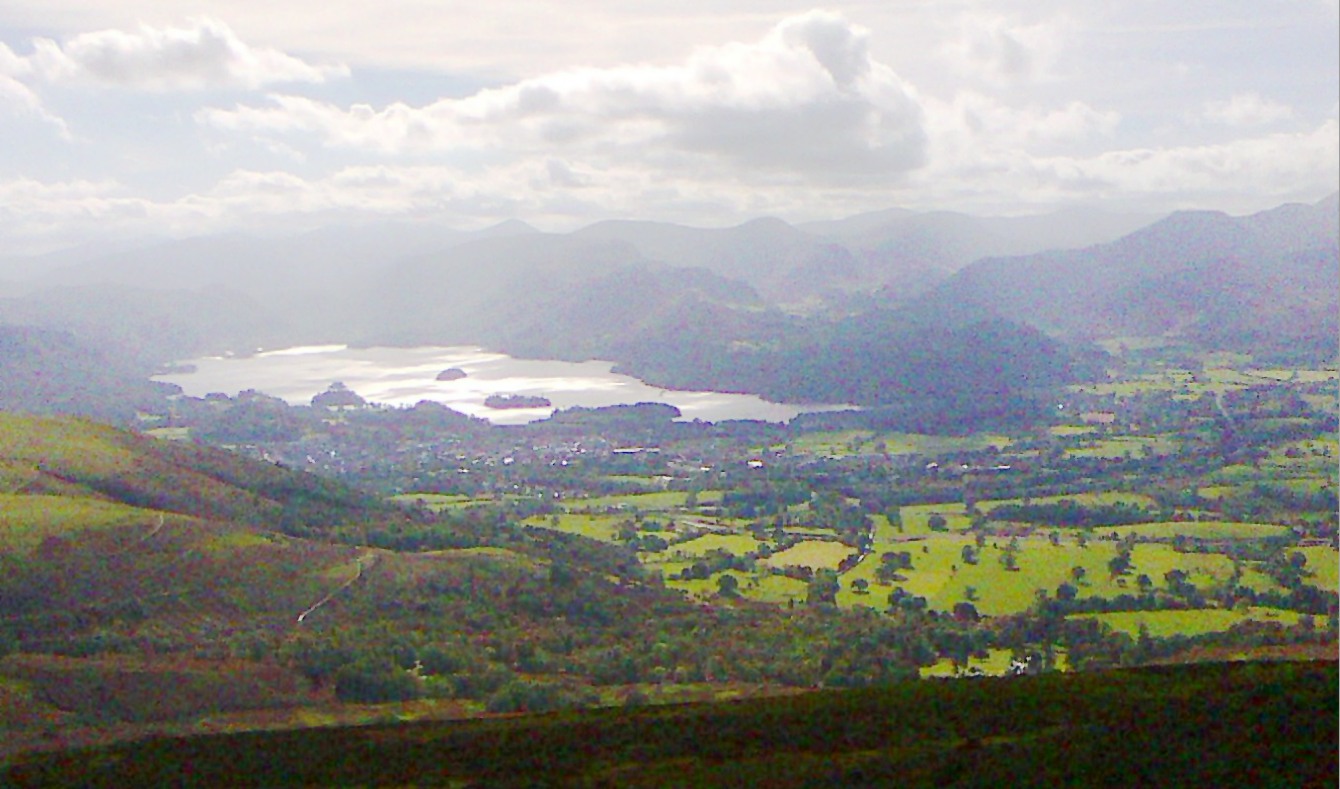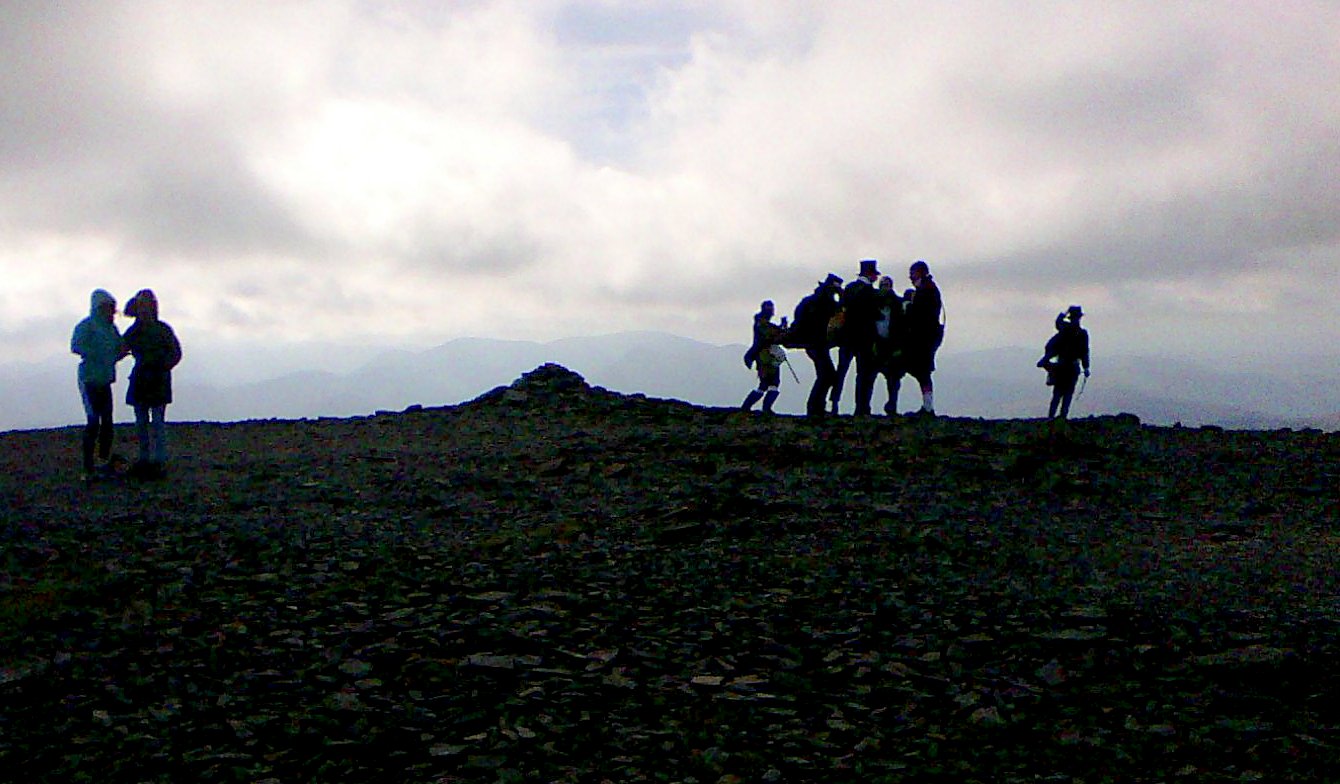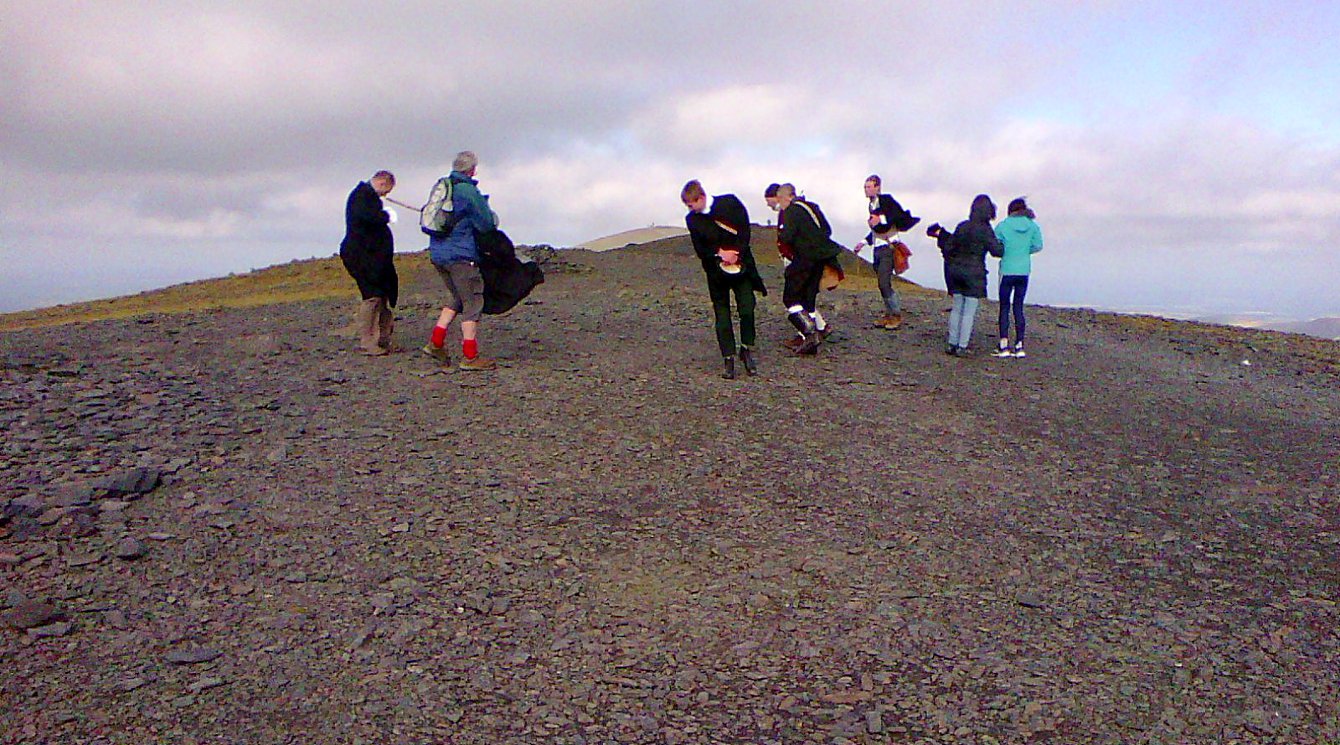
DOROTHY WORDSWORTH ON SCAFELL PIKE
 | |
By the early years of the 19th century, mountain climbs in the Lake District were becoming popular, possibly inspired by Samuel Taylor Coleridge's adventures. Dorothy Wordsworth, brilliant sister of the poet William, visited Scafell Pike in 1818, with her friend, painter and occasional poet Mary Barker (plus Miss Barker's maid, and a hired porter, and a Borrowdale "statesman" shepherd to act as guide). The letters written by Dorothy and Mary on top of the mountain, to their friend Miss Hutchinson in Wales, seem not to have survived, but a couple of weeks later, Dorothy described the excursion in a letter to another friend, William Johnson (former curate of Grasmere, who had moved to London). In 1822, remarkably, William republished the letter with minor alterations (alongside another piece by Dorothy) in an appendix to his "Description of the Scenery of the Lakes"- making it appear to be his own work. Here is reprinted William's version, with notes on some points where Dorothy's original differs.
[from "Prose Works of William Wordsworth" vol. 2, edited by the Rev. Alexander B. Grosart, 1876]
Having left Rosthwaite in Borrowdale, on a bright morning in the first week of October, we ascended from Seathwaite to the top of the ridge, called Ash-course [Dorothy points out, perceptively, that this "we suppose may be a corruption of Esk Hawes, as it is a settling between the mountains over which the people are accustomed to pass..."], and thence beheld three distinct views;- on one side, the continuous Vale of Borrowdale, Keswick, and Bassenthwaite,-with Skiddaw, Helvellyn, Saddle-back, and numerous other mountains- and, in the distance, the Solway Frith and the Mountains of Scotland;- on the other side, and below us, the Langdale Pikes- their own vale below them;- Windermere,- and, far beyond Windermere, Ingleborough in Yorkshire. But how shall I speak of the deliciousness of the third prospect! At this time, that was most favoured by sunshine and shade. The green Vale of Esk- deep and green, with its glittering serpent stream, lay below us; and, on we looked to the Mountains near the Sea,- Black Comb pre-eminent,- and, still beyond, to the Sea itself, in dazzling brightness. Turning round we saw the Mountains of Wastdale in tumult; to our right, Great Gavel, the loftiest, a distinct, and huge form, though the middle of the mountain was, to our eyes, as its base.
We had attained the object of this journey; but our ambition now mounted higher. We saw the summit of Scaw-fell, apparently very near to us; and we shaped our course towards it; but, discovering that it could not be reached without first making a considerable descent, we resolved, instead, to aim at another point of the same mountain, called the Pikes, Which I have since found has been estimated as higher than the summit bearing the name of Scawfell Head, where the Stone Man is built.
The sun had never once been overshadowed by a cloud during the whole of our progress from the centre of Borrowdale. On the summit of the Pike, which we gained after much toil, though witbout difficulty, there was not a breath of air to stir even the papers containing our refreshment, as they lay spread out upon a rock. The stillness seemed to be not of this world:- we paused, and kept silence to listen; and no sound could be heard: the Scawfell Cataracts were voiceless to us; and there was not an insect to hum in the air [In Dorothy's version, "We were far above the reach of the cataracts of Scaw Fell; and not an insect was there to hum in the air."]. The vales which we had seen from Ash-course lay yet in view; and, side by side with Eskdale, we now saw the sister Vale of Donnerdale terminated by the Duddon Sands. But the majesty of the mountains below, and close to us, is not to be conceived. We now beheld the whole mass of Great Gavel from its base,- the Den of Wastdale at our feet- a gulf immeasurable: Grasmire and the other mountains of Crummock- Ennerdale and its mountains; and the Sea beyond! We sat down to our repast, and gladly would we have tempered our beverage (for there was no spring or well near us) with such a supply of delicious water as we might have procured, had we been on the rival summit of Great Gavel; for on its highest point is a small triangular receptacle in the native rock; which, the shepherds say, is never dry. There we might have slaked our thirst plenteously with a pure and celestial liquid, for the cup or basin, it appears, has no other feeder than the dews of heaven, the showers, the vapours, the hoar frost, and the spotless snow.
While we were gazing around, 'Look,' I exclaimed, 'at yon ship upon the glittering sea!' 'Is it a ship?' replied our shepherd-guide. 'It can be nothing else,' interposed my companion; 'I cannot be mistaken, I am so accustomed to the appearance of ships at sea.' The Guide dropped the argument; but, before a minute was gone, he quietly said, 'Now look at your ship; it is changed into a horse.' So indeed it was,- a horse with a gallant neck and head. We laughed heartily; and, I hope, when again inclined to be positive, I may remember the ship and the horse upon the glittering sea; and the calm confidence, yet submissiveness, of our wise Man of the Mountains, who certainly had more knowledge of clouds than we, whatever might be our knowledge of ships.[Dorothy leaves this until the end of the narrative, as what we might now call an "and finally". She first saw the "ship", and it was Mary who so confidently confirmed her view.]
I know not how long we might have remained on the summit of the Pike, without a thought of moving, had not our Guide warned us that we must not linger; for a storm was coming. We looked in vain to espy the signs of it. Mountains, vales, and sea were touched with the clear light of the sun. 'It is there,' said he, pointing to the sea beyond Whitehaven, and there we perceived a light vapour unnoticeable but by a shepherd accustomed to watch all mountain bodings. We gazed around again, and yet again, unwilling to lose the remembrance of what lay before us in that lofty solitude; and then prepared to depart. Meanwhile the air changed to cold, and we saw that tiny vapour swelled into mighty masses of cloud which came boiling over the mountains. Great Gavel, Helvellyn, and Skiddaw, were wrapped in storm; yet Langdale, and the mountains in that quarter, remained all bright in sunshine. Soon the storm reached us; we sheltered under a crag; and almost as rapidly as it had come it passed away, and left us free to observe the struggles of gloom and sunshine in other quarters. Langdale now had its share, and the Pikes of Langdale were decorated by two splendid rainbows. Skiddaw also had his own rainbows. Before we again reached Ash-course every cloud had vanished from every summit.
I ought to have mentioned that round the top of Scawfell-PIKE not a blade of grass is to be seen. Cushions or tufts of moss, parched and brown, appear between the huge blocks and stones that lie in heaps on all sides to a great distance, like skeletons or bones of the earth not needed at the creation, and there left to be covered with never-dying lichens, which the clouds and dews nourish; and adorn with colours of vivid and exquisite beauty. Flowers, the most brilliant feathers, and even gems, scarcely surpass in colouring some of those masses of stone, which no human eye beholds, except the shepherd or traveller be led thither by curiosity: and how seldom must this happen! For the other eminence is the one visited by the adventurous stranger; and the shepherd has no inducement to ascend the PIKE in quest of his sheep; no food being there to tempt them.
We certainly were singularly favoured in the weather; for when we were seated on the summit, our conductor, turning his eyes thoughtfully round, said, 'I do not know that in my whole life, I was ever, at any season of the year, so high upon the mountains on so calm a day.' (It was the 7th of October.) Afterwards we had a spectacle of the grandeur of earth and heaven commingled; yet without terror. We knew that the storm would pass away;- for so our prophetic Guide had assured us. [William's revision omits Dorothy's details of the route down from Esk Hause- via Sprinkling Tarn and Sty Head, where she admired the views of Wasdale and Great Gable]
Before we reached Seathwaite in Borrowdale, a few stars had appeared, and we pursued our way down the Vale, to Rosthwaite, by moonlight.
For a prologue and appendix to this story, involving my hero Mary Barker, see here. Also, here's an anonymous account of another pedestrian tour in the area, published just a few days before the above excursion took place.
Also, here's my bicentenary celebration video, filmed on 6 October 2018 (because the weather forecast for 7 October was much less promising). It's an attempt to imagine what Dorothy Wordsworth would have filmed in 1818 if she had a video camera.
In 2018, the Wordsworth Trust celebrated the bicentenary of Dorothy and Mary's with a walk up a different mountain on a different day of the year ...
Since the fashion for "three peaks" charity challenges arose, organisations have been discouraged from taking parties up Scafell Pike, so instead the Wordsworth Trust very reasonably chose an oblique homage, recreating an ascent of Skiddaw which had taken place simultaneously with the 1818 Scafell Pike trip, by Miss Barker's guests for tea the previous day: artist Sir George Beaumont (who later effectively founded the National Gallery) and anti-slavery campaigner William Wilberforce with his family, plus various others. The date of the celebration, 29 September, was presumably in deference to the impending start of the academic year for higher education institutions.
The leaders wore period costume, and participants were encouraged to do likewise. The weather was, by Skiddaw standards, rather lovely.

However, it was quite blustery, and a fundamental truth learned the hard way by William Wordsworth at the Waterloo celebrations on the same mountain in 1815 became sadly apparent. Wearing an indoor dress cloak on a mountain climb is a health-and-safety nightmare, because it's basically a sail in search of a breeze.

In 1815, the unfortunate poet ended up knocking over the cauldron in which water was being heated for the celebration punch. In 2018, the cloak smacked its wearer so hard in the face that his glasses flew off. Just how far they flew was unclear, so the excursion turned into a spectacle-hunt:





